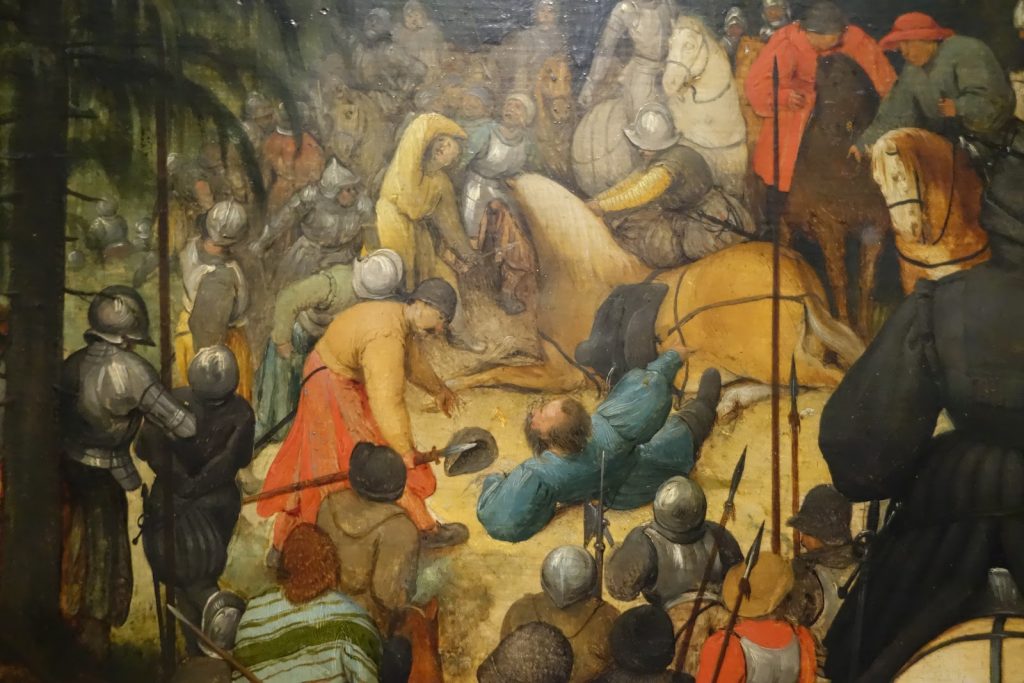(The Conversion of Saul, by Pieter Brugel the Elder, courtesy of Wikimedia Commons.)
Daily Office Readings for Friday, July 5, 2019:
AM Psalm 140, 142; PM Psalm 141, 143:1-11(12)
1 Samuel 13:19-14:15; Acts 9:1-9; Luke 23:26-31
Although Saul’s conversion on the road to Damascus is likely one of the best known stories in the book of Acts, chances are we overlook a small piece in this story.
Saul is not alone when he hears the voice of Jesus; he has traveling companions. When he hears the voice of Jesus, his companions don’t see the flash of light or hear the voice of Jesus. Yet when Saul-soon-to-be-Paul gets up and discovers he’s been struck blind, he has to depend on people who did not see what he saw, did not hear what he heard, for the next phase of his conversion experience. First, it is his traveling companions, who by the account in Acts, simply display profound bewilderment. From their point of view, they saw Saul babbling to himself, falling to the ground, and arising blind. They were not expecting to have to care for a blind man on this trip, and there had to be more than a little fear on their part.
I can imagine their conversation. “What happened? Did he hit his head on a rock when he fell to the ground? Did he have a seizure of some sort? How did this happen? Was it an evil spirit? Is this going to happen to us, too?”
Later in the story, in the paragraphs just after our reading, Saul will have to depend on Ananias to care for him, and let’s just say Saul’s reputation preceded him. Ananias knows Saul as a despised persecutor of Christians. Ananias only has his own encounter with God in a vision as his starting point, and God’s assurance that it will be okay. I’m certain Ananias had to overcome no small amount of fear to even care for Saul when he encounters him at the house of a man named Judas. Although the Book of Acts doesn’t mention a conversation at that house with the folks that lived there, I’m certain there was one, and I can’t help but wonder if Ananias heard something from the occupants of the house or from Saul himself that gave him some reason to help him trust that this conversion was the real deal.
When we look at this story as a template to understand what a conversion experience is all about, we realize it doesn’t happen in a “Me and God” vacuum. To be sure, the sudden encounter with the voice of God or the voice of Jesus is the initiating experience–but it takes other voices to help complete the experience, and it takes the overcoming of our own fear to continue to hear other voices beyond the initiating one.
What we also learn from this story is that the other voices do not necessarily have to be voices that sound like us, or agree with us, or even come from the same point of view as us. In fact, it’s probably best they don’t, because those voices tend to carry more weight. If the voices sounded too much like us, it would only affirm our already closely-held beliefs, and not challenge us to move forward even in our own blindnesses. If we sit with the times in our lives that we ever did a 180 degree shift on our own closely-held opinions, chances are it wasn’t our own voice that changed our mind, was it? Something that comes to mind for me are the people who once held a firmly unshakeable negative opinion about people of a different ethnicity, or sexual/gender orientation, but had a conversion experience about that. It almost always takes the actual meeting of another person from that other group–and hearing their story–to overcome those intangible fears that underpin that closely held belief–and to suddenly discover a connection that we can hold more deeply than the fear.
Who are the other voices that have guided you in your own conversion experiences?
Maria Evans splits her week between being a pathologist and laboratory director in Kirksville, MO, and gratefully serving in the Episcopal Diocese of Missouri , as the Interim Pastor at Christ Episcopal Church, Rolla, MO.

